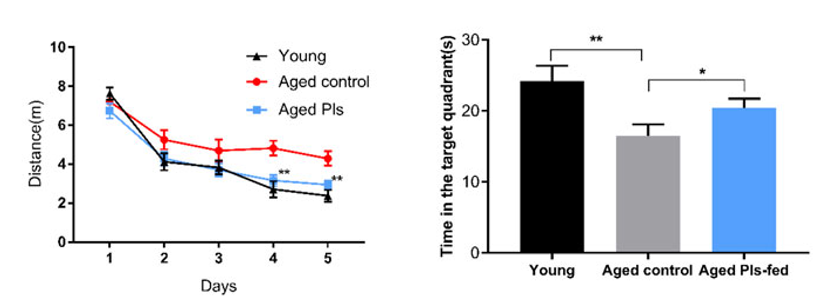Key Points:
- Treatment with plasmalogens improves the learning and memory of aged mice.
- Aged mice treated with plasmalogens have a healthier appearance with glossier fur.
- Plasmolgens promote the generation of new neurons while reducing inflammation.
The connections between the neurons in our brain begin to dwindle as we age, leading to cognitive deficits such as a reduced capacity to learn and remember. While these cognitive deficits also tend to increase with age, plasmalogens — key lipid (fat) molecules found in the membranes of our neurons — tend to decrease. Mounting research suggests that reduced plasmalogens contribute to neurodegenerative diseases, including Alzheimer’s disease and Parkinson’s disease, but until now it hasn’t been clear why.
As published in Frontiers in Molecular Biosciences, researchers from Shanghai Jiao Tong University examined the effect of plasmalogens on the cognition of aged mice. Gu and colleagues found that aged mice treated with plasmalogens had better cognitive performance due to increased synaptic plasticity (connections between neurons) and neurogenesis (generation of new neurons). Furthermore, the treated mice had thicker, glossier fur as compared to untreated mice. Plasmalogen supplementation was also shown to alleviate inflammation, a hallmark of aging and a key factor underlying neurodegeneration.
“Our results in the aging mouse model provide novel evidence that…plasmalogens treatment for 2 months is effective in improving cognitive function of the elderly,” the investigators wrote.
Plasmalogens Prevent Cognitive Deficits and Neurodegeneration
Gu and colleagues assessed the cognition of aged mice with the Morris water maze test. Following plasmalogen treatment for two months, the aged mice performed significantly better on the test. Additionally, the aged mice fed plasmalogens had a healthier appearance with glossier and thicker hair than untreated aged mice, suggesting that plasmalogens can reverse age-related conditions other than cognitive deficits.

Neurogenesis, a process that declines with age and underlies cognitive decline, occurs when we learn and form new memories. Gu and colleagues examined neurogenesis by measuring the abundance of a protein called SOX2+, a marker for neural stem cells that represent elevated neurogenesis. They found that aged mice given plasmalogens had an increased number of cells with SOX2+ abundance, indicating that plasmalogens may protect against the age-related decline in neurogenesis.
Gu and colleagues also examined the effect of plasmalogens on brain gene activation in aged mice. They found that aged mice fed plasmalogens had changes in genes involved in synaptic plasticity, associated with learning and memory. Furthermore, plasmalogens were shown to suppress inflammatory signaling proteins and microglia activation. Microglia cells are brain-specific immune cells that promote inflammation if they are overly active, a phenomenon that may underlie neurodegeneration.

Are Fats the Secret to Brain Health?
Gu and colleagues show that plasmalogen treatment alleviates age-related memory issues, noting that this may be due to increasing synaptic plasticity and neurogenesis. Omega-3 fatty acids, especially DHA seem to improve brain function and are associated with a lower risk of dementia. Therefore, it is possible that consuming the right fats as we age could keep our brains healthy.
Despite uncertainty regarding blood-brain barrier crossing, oral plasmalogen supplements are available, mostly through online sellers in Japan. But in fact, plasmalogens are also found in various seafoods, such as mussels and scallops, as well as being present in high quantities in pork and beef. Other supplements on the market intend to activate individuals’ endogenous plasmalogens to help improve cognition and protect our neurons as we age. As always, please check with your medical care provider before starting any supplements, as they can interact with other medications.